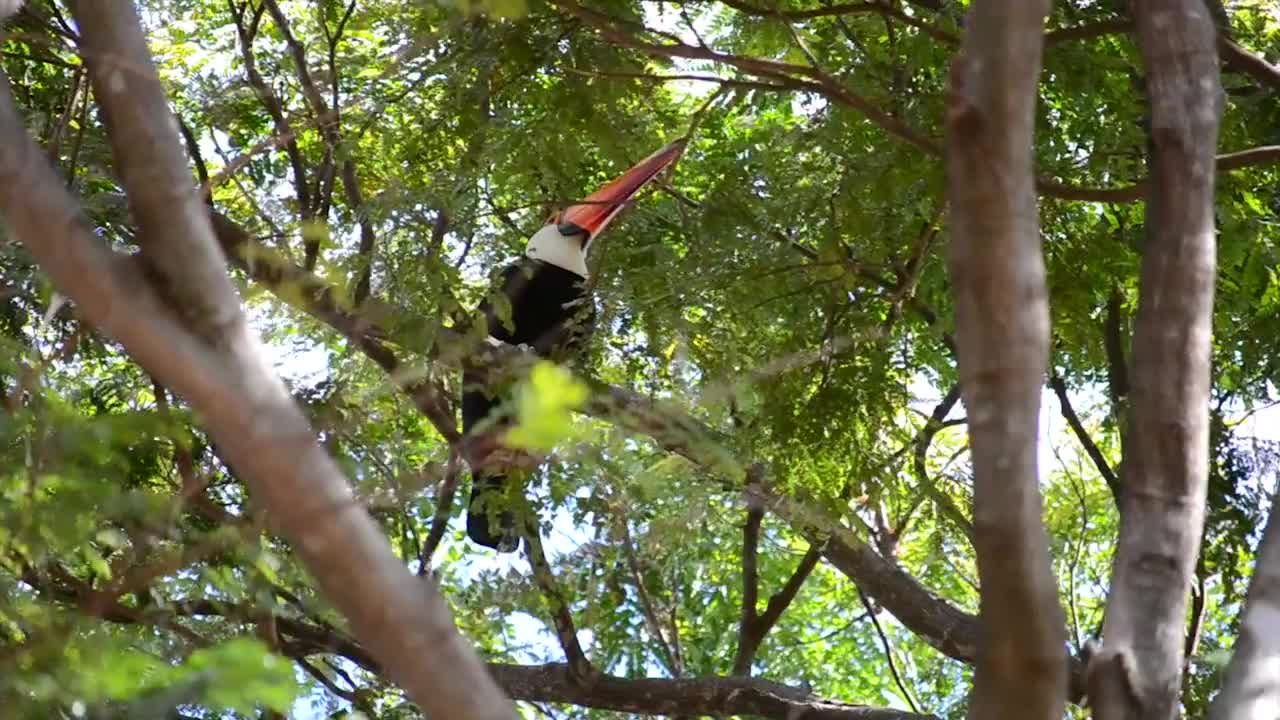Premium Only Content

Brazilian Tucano Bird Spotted On Tree Branch
In feeding, the toucan obtains food with the saw-edged bill and must toss back its head before swallowing. Although toucans are often considered to be primarily fruit eaters, most species consume a wide variety of food, including insects, snakes, frogs, and occasionally even small mammals. Toucans are also predators on the contents of songbird nests, consuming both eggs and nestlings. In foraging, toucans form large associations of two or more species that search for fruiting trees.
Measuring 63.5 cm (25 in.) in length, the toco toucan is the largest of all toucans. Its black body and white throat are overshadowed by its most recognizable trait: a large colorful beak.
The bright orange beak is about 19 cm (8 in.) long – one third of the bird’s total length. But despite its substantial size, the beak weighs less than you may think. Composed of the protein keratin, the structure of beak incorporates many air pockets allowing for a very low mass.
Furthermore, recent research has concluded that toucans regulate body temperature by adjusting the flow of blood to their beak. More blood flow means more heat is released. When toucans sleep, they tuck their beak under their feathers to keep them warm.
Toco toucans also use their beaks to pluck and peel fruit, their main source of food. In addition, the beak houses a flat tongue of the same length, which helps the toucan catch insects, frogs, and reptiles. Toco toucans also occasionally eat the eggs of other birds.
Although they spend a lot of time in trees, they are not very good at flying. Toucans mainly travel among trees by hopping. When they do take flight, they flap their wings vigorously and glide, traveling only short distances.
Toucans nest in the hollows of trees. They often move into cavities created and abandoned by woodpeckers.
Several toucans live together in a single hollow. It is in these hollows that they lay their eggs, generally two to four a year. Both parents incubate the eggs for 16-20 days. Once the chicks hatch, both parents continue to care for the young. Baby toucans are not born with an excessively large beak; the beak grows as the birds develop.
Native to South America, toco toucans inhabit a range of habitats including tropical forests, savannas, and shrubland.
-
 LIVE
LIVE
Wendy Bell Radio
5 hours agoTruth Is A 4 Letter Word
7,210 watching -
 1:10:39
1:10:39
Chad Prather
14 hours agoRise and Walk, What Happens When Jesus Interrupts Your Normal
60.5K51 -
 LIVE
LIVE
LFA TV
12 hours agoLIVE & BREAKING NEWS! | WEDNESDAY 11/19/25
3,195 watching -
 16:09
16:09
Nikko Ortiz
1 day agoMilitary Fails That Got Soldiers In Trouble
26.6K12 -
 LIVE
LIVE
PudgeTV
3 hours ago🟣 Arc Raiders - Gaming on Rumble | The Rumskateers Go Topside
78 watching -
 LIVE
LIVE
Reidboyy
11 hours ago24/7 BO7 Camo Grind! Stream Doesn't End Until I Unlock EVERY Camo in Black Ops 7!
119 watching -
 1:05:07
1:05:07
Julie Green Ministries
3 hours agoLIVE WITH JULIE
75.2K139 -
 LIVE
LIVE
WorldofGaming
1 day agoTHE ULTIMATE MARIO KART WORLD MARATHON!
128 watching -
 2:49:34
2:49:34
Country Craft Streams
3 hours agoJunkyard Juggernaut Clash
3K -
 1:06:26
1:06:26
Crypto Power Hour
10 hours ago $4.07 earnedThe Rise & Fall Of Samourai Wallet…The Truth
30.6K8